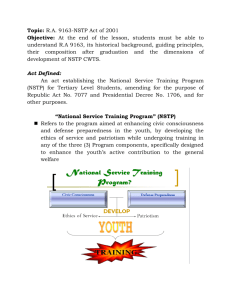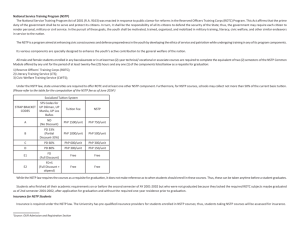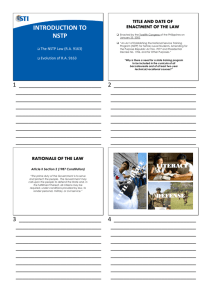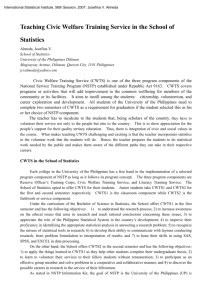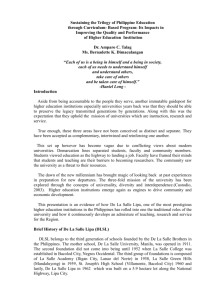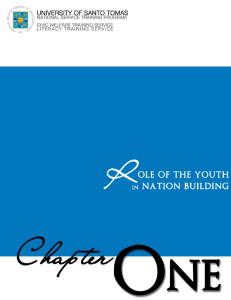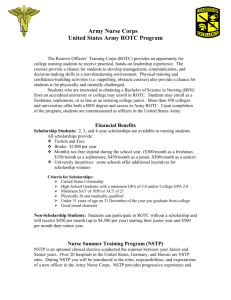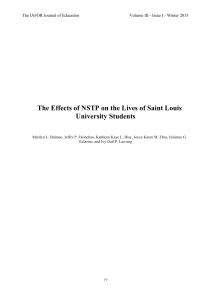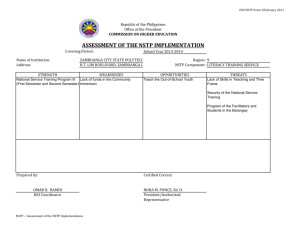Approved Resolution No. 2011-11 - University Student Government
advertisement
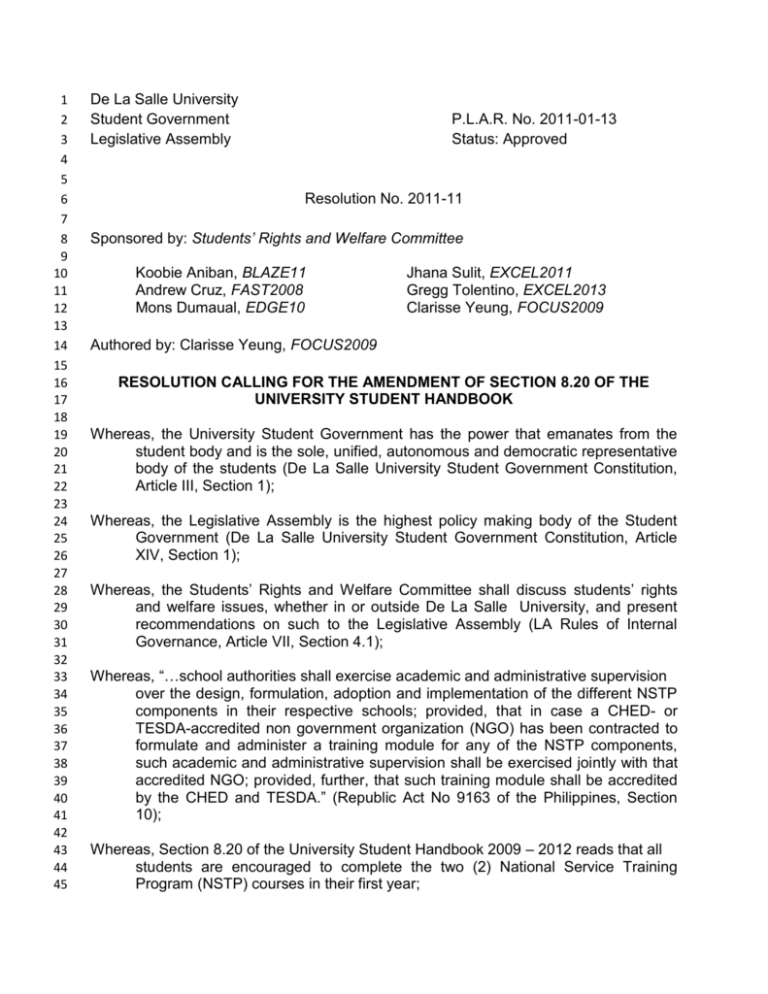
1 2 3 4 5 6 7 8 9 10 11 12 13 14 15 16 17 18 19 20 21 22 23 24 25 26 27 28 29 30 31 32 33 34 35 36 37 38 39 40 41 42 43 44 45 De La Salle University Student Government Legislative Assembly P.L.A.R. No. 2011-01-13 Status: Approved Resolution No. 2011-11 Sponsored by: Students’ Rights and Welfare Committee Koobie Aniban, BLAZE11 Andrew Cruz, FAST2008 Mons Dumaual, EDGE10 Jhana Sulit, EXCEL2011 Gregg Tolentino, EXCEL2013 Clarisse Yeung, FOCUS2009 Authored by: Clarisse Yeung, FOCUS2009 RESOLUTION CALLING FOR THE AMENDMENT OF SECTION 8.20 OF THE UNIVERSITY STUDENT HANDBOOK Whereas, the University Student Government has the power that emanates from the student body and is the sole, unified, autonomous and democratic representative body of the students (De La Salle University Student Government Constitution, Article III, Section 1); Whereas, the Legislative Assembly is the highest policy making body of the Student Government (De La Salle University Student Government Constitution, Article XIV, Section 1); Whereas, the Students’ Rights and Welfare Committee shall discuss students’ rights and welfare issues, whether in or outside De La Salle University, and present recommendations on such to the Legislative Assembly (LA Rules of Internal Governance, Article VII, Section 4.1); Whereas, “…school authorities shall exercise academic and administrative supervision over the design, formulation, adoption and implementation of the different NSTP components in their respective schools; provided, that in case a CHED- or TESDA-accredited non government organization (NGO) has been contracted to formulate and administer a training module for any of the NSTP components, such academic and administrative supervision shall be exercised jointly with that accredited NGO; provided, further, that such training module shall be accredited by the CHED and TESDA.” (Republic Act No 9163 of the Philippines, Section 10); Whereas, Section 8.20 of the University Student Handbook 2009 – 2012 reads that all students are encouraged to complete the two (2) National Service Training Program (NSTP) courses in their first year; 46 47 48 49 50 51 52 53 54 55 56 57 58 59 60 61 62 63 64 65 66 67 68 69 70 71 72 73 74 75 76 77 78 79 80 81 82 83 84 85 86 87 88 89 90 91 Whereas, there is a need to clarify the components of the National Service Training Program (NSTP) of the De La Salle University since DLSU offers only two out of three components of the NSTP Law. These are the Reserved Officers Training Corps (ROTC) and Civic Welfare Training Service (CWTS); Whereas, the revised NSTP Implementing Rules and Regulations (IRR) Series of 2009 states that a NSTP general orientation will be held for all freshmen (prior to enrolment to their preferred NSTP course) during the first term of their first year in the university that will discuss the NSTP Law (Republic Act No. 9163), CWTS and ROTC components (Conversation with Ms. Terteen Omaña on June 01, 2011, See Appendix A); Whereas, DLSU is autonomous from the Commission on Higher Education (CHED) due to the CHED Memorandum order (CMO) No. 59 series of 2007 and has the right to innovate and implement NSTP policies as long as the university follows the minimum requirement set by CHED (See Appendix B); Whereas, the module or general orientation given to freshmen students will be updated and based on the revised NSTP Implementing Rules and Regulation (IRR) Series of 2009 (See Appendix C); Whereas, freshmen students will be given the option to choose between CWTS and ROTC for their NSTP courses for the remaining two (2) terms of their first year (See Appendix A); Whereas, freshmen students will take their preferred NSTP in the remaining two terms of their first year; Wherefore, be it resolved that the guidelines for the National Service Training Program (NSTP) of the De La Salle University be updated as stated in the Implementing Rules and Regulations (IRR) Series of 2009; Wherefore, be it further resolved that Section 8.20 read that “All students are encouraged to complete the two (2) NSTP courses in their first year, provided that they attend the NSTP General Orientation for all freshmen students (as mandated by the revised NSTP IRR of 2009) offered during the first term of the school year. Wherefore, be it finally resolved that all the amendments concerning the resolution be forwarded to the Student Handbook Revisions Committee for considerations in the Student Handbook 2012-2015. Adopted, June 15, 2011 92 93 94 95 96 97 98 99 100 101 102 103 104 105 106 107 108 109 110 111 112 113 114 115 116 117 118 119 120 121 122 123 124 125 126 127 128 129 130 131 132 133 134 135 136 137 APPENDIX A Conversation with Ms. Terteen Omaña (through email) Dear Clarisse, Peace! I have attached the information (in PDF file) you need for your proposed resolution (new NSTP policy). Please be cautious in using the information provided. Just to reiterate what we have discussed this afternoon, the new arrangement is both due to RCUP (Rationalized Classroom Utilization Plan and increasing number of CWTS students, and stakeholders. I am not sure if this will be adopted permanently. But definitely this academic year, we will be implementing the new arrangement (please refer to the document). FYI, here are some of the new activities brought about the new arrangement: - NSTP general orientation for all freshmen (prior to enrollment; students are given time to choose unlike before) – this will cover discussion on the NSTP Law (RA9163), CWTS and ROTC component - NSTP promotion week Regarding the module as stated in the revised NSTP IRR of 2009, which CHED requires to all colleges and universities, DLSU has the leeway to innovate and implement NSTP (since we are autonomous from CHED) as long as we follow minimum requirement. Nonetheless, we are in the process of updating our module in response to the IRR and to the needs of the Lasallian students. I hope this can already help you with your resolution. Please do consult ROTC on this also. Thanks, Terteen Gail B. Omaña NSTP-CWTS Coordinator Center for Social Concern and Action (COSCA) 138 139 140 141 142 143 144 145 146 147 148 149 150 151 152 153 154 155 156 157 158 159 160 161 162 163 164 165 166 167 168 169 170 171 172 173 174 175 176 177 178 179 180 181 182 183 APPENDIX B CHED MEMORANDUM ORDER (CMO): 59 Series of 2007 SUBJECT : GRANT OF AUTONOMOUS AND DEREGULATED STATUS TO QUALIFIED PRIVATE HIGHER EDUCATION INSTITUTIONS (PHEIs) In accordance with the provisions of CHED Memorandum Order (CMO) No. 52, series of 2006 “New Policies and Guidelines for the Grant of Autonomous and Deregulated Status to Selected Private Higher Education Institutions with Benefits Accruing Thereto”, CHED Memorandum Order No. 22, series of 2007 “Supplemental to CMO No. 52, series of 2006”, and by virtue of CHED Resolution Nos. 535-2007 & 768-2007, the Commission on Higher Education hereby grants autonomous and deregulated status to the following higher education institutions: A. PHEIs Granted Autonomous Status for five (5) years: November 15, 2007 to November 14, 2012 REGION II XI CAR NCR NCR NCR NCR NCR NCR NCR INSTITUTION 1. UNIVERSITY OF ST. LOUIS, Tuguegarao City 2. ATENEO DE DAVAO UNIVERSITY, Davao City 3. SAINT LOUIS UNIVERSITY, Baguio City 4. ASSUMPTION COLLEGE, Makati City 5. ATENEO DE MANILA UNIVERSITY, Quezon City 6. CENTRO ESCOLAR UNIVERSITY, City of Manila 7. DE LA SALLE UNIVERSITY, City of Manila 8. MIRIAM COLLEGE FOUNDATION, Quezon City 9. ST. JOSEPH’S COLLEGE OF QUEZON CITY, Quezon City 10. UNIVERSITY OF STO. TOMAS, City of Manila 184 185 186 187 188 189 190 191 192 193 194 195 196 197 198 199 200 201 202 203 204 205 206 207 208 209 210 211 212 213 214 215 216 217 218 219 220 221 222 223 224 225 226 227 228 229 230 231 232 233 234 235 236 237 APPENDIX C REVISED IMPLEMENTING RULES AND REGULATIONS OF THE NATIONAL SERVICE TRAINING PROGRAM (NSTP) Pursuant to Section 12 of Republic Act No. 9163 otherwise known as the National Service Training Program (NSTP) Act of 2001, the Commission on Higher Education (CHED), Technical Education and Skills Development Authority (TESDA), and Department of National Defense (DND), in consultation with concerned government agencies, the Philippine Association of State Universities and Colleges (PASUC), Coordinating Council of Private Educational Associations of the Philippines (COCOPEA), Non-Government Organizations (NGOs) and recognized student organizations, hereby jointly issue, adapt and promulgate the following implementing rules and regulations in implement the provisions of the Act. Rule I GUIDING PRINCIPLES Section 1. Guiding Principle. While it is the prime duty of the government to serve and protect its citizens, in turn it shall be the responsibility of all citizens to defend the security and promote the general welfare of the State, and in fulfillment thereof, the government may require each citizen to render personal military or civil service. Section 2. Role of the Youth a. In recognition of the vital role of the youth in nation building, the State shall promote civic consciousness among them and shall develop their physical, moral, spiritual, intellectual and social well-being. It shall inculcate the ideals of patriotism, nationalism, and advance their involvement in public and civic affairs. b. As the most valuable resource of the nation, they shall be motivated, trained, organized and involved in military, literacy, civic welfare programs and other similar endeavors in the service of the nation. Rule III PROGRAM IMPLEMENTATION Section 4. Coverage a. All incoming first year students, male and female, starting School Year (SY) 2002-2003, enrolled in any baccalaureate and in at least two (2) year technical-vocational or associate courses, are required to complete one (1) NSTP component of their choice, as a graduation requirement. The above provision, however, does not cover the following: a.1 Students who finished or graduated from a baccalaureate degree or two year technical-vocational or associate course and pursuing or enrolled in another or additional baccalaureate degree or two-year technical-vocational or associate course in SY 20032004, and; a.2 Students who completed any of the three NSTP components but considered freshmen to the course where they transferred or shifted. a.3 Foreign students or aliens 238 239 240 241 242 243 244 245 246 247 248 249 250 251 252 253 254 255 256 257 258 259 260 261 262 263 264 265 266 267 268 269 270 271 272 273 274 275 276 277 278 279 280 281 282 283 b. All higher and technical-vocational education institutions must offer at least one (1) of the NSTP components. c. State Universities and Colleges (SUCs), shall offer the ROTC component and at least one (1) other NSTP component. d. The Philippine Military Academy (PMA), Philippine Merchant Marine Academy (PMMA), and Philippine National Police Academy (PNPA) are exempted from the NSTP in view of the special character of these institutions. Other State Universities and Colleges of similar nature will be exempted subject to approval of the Department of National Defense. e. Private higher and technical-vocational education institutions with at least 350 student cadets, may offer the ROTC component and consequently establish/maintain a Department of Military Science and Tactics (DMST), subject to the existing rules and regulations of the Armed Forces of the Philippines (AFP). Section 5. Program Components a. The NSTP shall have the following components which the students can choose from as defined in Rule II, Section 3 hereof: The Reserve Officers Training Corps, Literacy Training Service (LTS), and Civic Welfare Training Service (CWTS). b. All program components, the ROTC in particular, shall give emphasis on citizenship training and shall instill patriotism, moral virtues, respect for the rights of civilians and adherence to the Constitution. c. The CHED, TESDA in consultation with the DND, and PASUC, COCOPEA and other concerned government agencies, may design and implement such other non-military training components as may be necessary in consonance with the provisions of R.A. 9163. d. Within thirty (30) days from the approval of this revised IRR, the CHED, TESDA, and the DND shall jointly issue the minimum standards for the three (3) NSTP components which shall form part of these guidelines. Section 6. Duration and Equivalent Course Unit a. Each of the aforementioned NSTP components shall be undertaken for an academic period of two (2) semesters. It shall be credited for three (3) units per semester, for fifty-four (54) to ninety (90) training hours per semester. b. A One (1) Summer Program (OSP) in lieu of the two (2) semester program may be designed, formulated and adopted by the DND, CHED and TESDA, subject to the capability of the school and the AFP to handle the same. c. Earned NSTP units shall not be included in the computation of Grade Point Average (GPA) grades of college graduating students.
